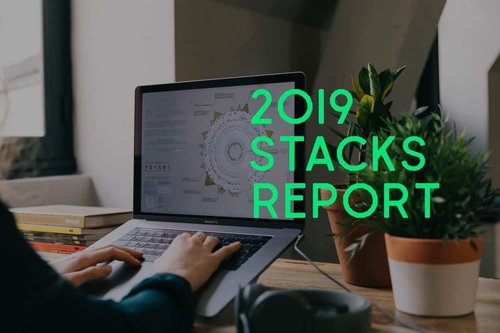Developers on the Job: The Right Time for Salary Talks
16 avr. 2019
8min


Web editor as well as a certified web integrator
Whether we realize it or not, we spend our lives negotiating matters big or small. So why is it that when the question of money comes up, embarrassment can quickly set in. Talking about ourselves is not always easy, and discussing money matters can make us feel even less comfortable. Renegotiating your salary once you’ve taken up a post means knowing how to do both. Developers are often seen as having a strong position in their market as their profiles are often coveted by recruiters and headhunters. Yet they often don’t know how to confidently approach the subject of a pay rise. We’ll be giving you the keys to effectively negotiate your salary depending on your work situation!
Negotiating your salary when your co-worker is earning more than you
It’s the end of the day. You go to a meet-up and hit it off with developers from another company. Then, during the conversation, you find out they are paid much more than you despite being at the same level. You put on a brave face, down your drink in one, and head for a refill at the nibbles bar to console yourself after this painful discovery. The next day you mention it briefly to your co-workers to share your woes of being underpaid. And here comes the embarrassing part: they also earn a higher salary. Yes, this can happen during your career (especially if you’re still junior); some developers will earn more than you. This situation can give cause for resentment, especially if the disparities are within the same company. A wage gap can be justified in some cases, while in others it cannot. These subtle aspects must all be taken into account when making your argument.
What not to say: “I heard that David earns a higher salary even though we joined the company at the same time, so…”
Before embarking on a risky negotiation, put yourself in the shoes of the company and retrace your journey with them: “When did I arrive?”, “What is my profile?”, “Have I proven myself?”, “Have I met my targets?” If you came to the negotiating table merely to compare yourself to your fellow developers, there’s a good chance your argument will be seen as jealousy or an inability to look at yourself (or both)!
It’s also possible that you negotiated your salary poorly when taking up the job, which would partly explain the wage gap. Maybe you hesitated about requesting a higher figure with the CTO or HR department for fear of being regarded for the role during your first job interviews or because you’ve internalized negative stereotypes.
Whatever the reason for the difference in pay, it’s key to prepare your argument by paying equal attention to form and content. Adopt a positive attitude and always be ready to listen to the other party. A good negotiation takes two, so it’s always best to know any potential hang-ups your manager might have so that you know how to defuse them. Don’t just recite a sales pitch without being ready to hear what they have to say.
In terms of content, mention the targets you’ve reached, put the tasks you perform into context and highlight the technical aspects you’ve learned during your career – don’t underestimate the importance of soft skills.
Jeremy Desvaux, Lead Developer at Wonderful, recalls some basic rules that apply to all wage negotiations: “Your approach has to be open, attentive, positive and constructive. Any opposite attitude will inevitably affect the quality of the conversation or have a negative impact on the employee. A meeting takes planning. The main mistake would be turning up out of the blue and thinking “I’ll just see what they say”.”
Negotiating your pay when you’re a developer… but have the tasks of a Lead Developer
Over time, you have acquired a global vision of the projects within the same company and have mastered the languages used, which means you can supervise tasks within budget and on time. You also know how to manage and motivate your team to progress in the same direction and achieve targets without a hitch. Your soft skills combined with your hard skills make you the technical person of reference for the company who can ensure the quality of the coding. It’s often you who people turn to if there’s a technical glitch. In short, you’re the perfect Lead Developer! Problem is, this is not really reflected in your job description, and so does not translate into higher pay. How do you make this role official?
What not to say: “As it’s me who’s running the company now…”
If this new role works for you and motivates you, you are entitled to expect a salary that is in line with your new responsibilities. You’ve probably had to show some human qualities, but you also have in-depth technical knowledge which has led you to being somewhere in between the two positions.
So, you can argue that both your soft and hard skills benefit the whole company. Some of your new responsibilities may be underestimated by the person who has a say on your earnings. So, take stock of the context of your development and put forward concrete examples that reflect the investment of effort you make day to day. Don’t be afraid to go over the multiple benefits you provide to the company by holding this unofficial post: “For example, I have naturally developed into more of a leadership role because it seemed necessary, and thanks to my daily actions (which were not originally part of the role), the team now works better, we have less negative feedback, more stability, etc. I would like to continue moving in this direction by formalizing this new role with new goals and a salary that reflects it”, Desvaux suggests.
In terms of getting the timing right for talking about salary with your superior, Eric Dykstein, Manager at Recrut-Info recalls: “Wage talks usually happen during annual performance reviews; if an “urgent” situation arises, it is recommended to request a private meeting with your supervisor to discuss the matter.” In other words, don’t wait for next year to express your dissatisfaction…
Negotiating your salary after growing in technical expertise
Have you had the opportunity to learn and master new technology or a new language during a project, training or in your own free time? Are your newly acquired skills leading you to work on new exciting projects? This might be your chance to negotiate a higher salary. As a developer in this situation, your best friend to achieve your goals when negotiating your pay is logic: gaining new technical skills reinforces your expertise and the value of your profile. If you are a front-end developer and have diversified yourself beyond JavaScript by adopting frameworks like Vue.js, your profile will have gained particular value. Mobile developers who are experts in Swift and Objective-C, as well as Java, are especially rare and so all the more sought after (and better paid).
To address the salary issue in this specific context, Dykstein recommends always keeping in mind that the job market is very advantageous for developers, especially for the most versatile of them: “Developers can rely on market tensions and standard wages which are steadily rising. They might also suggest that they have been approached by recruiters, without mentioning the salary offered (as on first contact recruiters tend to advertise a high salary to attract developers).” Obviously, you should avoid launching into self-important rhetoric or calling their bluff, as this will not work in your favor.
What not to say: “Just today I still had a dozen offers on LinkedIn including a job in the US, if you have nothing to offer me, then…”
While you should highlight your new skills, Desvaux also stresses the importance of always adapting to the context of the company: “If the company seriously needs a person who is familiar with a new language, or needs the developer to acquire a new skill that can be fully monetized by the company, that carries more weight than if the developer merely reduces the backlog of the existing team, or gains skills in a marginal technical aspect.”
Negotiating your salary during a project change
Your day-to-day tasks are essentially dedicated to creating applications or websites when, all of a sudden, you’re chosen to develop the company’s new internal tool. This tool is to make life easier for your whole team and will serve as an incredible time saver for administrative management and customer relations. No worries, you’re keen to accept this responsibility and now you’ve put your heart and soul into this new assignment. You lead the project to completion brilliantly (perhaps even by rallying some of your team members around you) until you become the person of reference for any “related” assignments. While you appreciate the confidence placed in your talents, you struggle to come to terms with the idea that these new challenges – as stimulating as they may be – do not translate into a pay rise. Are people taking advantage of your good will? It’s time to request a meeting to be sure.
Dykstein explains that “negotiating a salary rise during a project change is a little trickier; it might be justified to “give something back” if the technical environment is less interesting, but things are more difficult if skills are being gained that will enhance the developer’s profile.”
What not to say: “These new projects are all well and good, but when they don’t come with higher pay, I go into relaxation mode…”
Negotiating during a change in scope should serve to (politely) highlight the gap between the position you hold and your new duties. Set out your situation and emphasize the “all-terrain” aspect of your profile, as versatility is a valuable quality of a developer. Depending on the context, your argument can play up either the qualitative aspects (technology used, complexity) or quantitative aspects (scale of the task, time spent). When well founded, there is a good chance your negotiation will be successful. Generally speaking, it’s essential for you to earn more once you create added value. To achieve your goals, you’ll still have to be diplomatic when negotiating.
Some people put up with some changes without batting an eyelid until the situation becomes untenable, and that’s often when things explode. Make sure you don’t let events overwhelm you, so that you always remain in control of the situation and your feelings. If the prospect of new tasks and responsibilities worries you and a change in scope does not suit you, it’s better to share this with your supervisor as soon as possible, before committing just out of loyalty or kindness.
To ensure your pay negotiations have the best possible chance, regardless of your situation, here are three tips to keep in mind:
- Before and after. Use common sense when choosing the right moment to review your work situation. Avoid starting up talks between pints during after-work drinks or during the morning coffee machine rush. Likewise, regardless of the response you receive after the meeting, thank your manager for their time and stay positive if your request is refused: it shouldn’t call into question your work at the company or your legitimate salary expectations.
- Convince yourself in order to be convincing! Requesting a negotiation just because “it’s high time” or because you have a lingering loan to pay off is not necessarily the idea of the century. Even less so if you use your personal life as an argument. To convince the other party, you’ll have to use both content and form: a positive attitude and a belief that a pay rise is fully justified, founded on factual arguments.
- Don’t think only in terms of salary. Think also about the other benefits you could obtain, which may even prove to be more appealing than the pay rise itself. For example, doing training can be an opportunity to gain skills and become eligible for a higher salary, or working from home one or more days a week will reduce your travel costs and increase your sleep time!
This article is part of Behind the Code, the media for developers, by developers. Discover more articles and videos by visiting Behind the Code!
Want to contribute? Get published!
Follow us on Twitter to stay tuned!
Illustration by Brice Marchal

Inspirez-vous davantage sur : Career hacking
Because being a developer is not just about coding, we want to share dedicated tips on soft skills and career paths, help you stay up-to-date with your favorite technologies, and learn more about the job market.

Computing’s Gender Divide: Why Tech Is Stuck in the 1980s
Discover why the percentage of women who held computing-based jobs has been in a steady decline since the 1980s.
14 sept. 2020

5 Remote-work Lessons From the Open-source Community
The open-source movement has a few things it can share about remote working with the wider software-development community.
09 juin 2020

2019 Stacks Report
The most-mentioned technologies in the job specifications published on WTTJ's website in 2019 and the average number of applicants per technology.
21 avr. 2020

Engineering Management: An Interview with Saad Rehmani
Saad Rehmani, the VP of Engineering at Reddit, shares his most effective management strategies to handle the COVID-19 crisis.
07 avr. 2020

Engineering Management: An Interview with Rich Archbold
Rich Archbold, the VP of Engineering at Intercom, explains how to develop a management style and how to transition to managing other managers.
17 mars 2020
La newsletter qui fait le taf
Envie de ne louper aucun de nos articles ? Une fois par semaine, des histoires, des jobs et des conseils dans votre boite mail.

Vous êtes à la recherche d’une nouvelle opportunité ?
Plus de 200 000 candidats ont trouvé un emploi sur Welcome to the Jungle.
Explorer les jobs